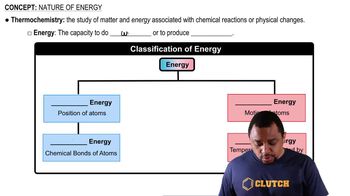(a) What amount of heat (in joules) is required to raise the temperature of 1 g of water by 1 kelvin? (b) What amount of heat (in joules) is required to raise the temperature of 1 mole of water by 1 kelvin?
Ch.5 - Thermochemistry

Brown14th EditionChemistry: The Central ScienceISBN: 9780134414232Not the one you use?Change textbook
Chapter 5, Problem 52
(b) Calculate the energy needed for this temperature change.
 Verified step by step guidance
Verified step by step guidance1
Identify the substance involved in the temperature change and its specific heat capacity (c).
Determine the mass (m) of the substance undergoing the temperature change.
Identify the initial (T_i) and final (T_f) temperatures of the substance.
Use the formula for calculating the energy change: \( q = m \cdot c \cdot \Delta T \), where \( \Delta T = T_f - T_i \).
Substitute the known values into the formula to calculate the energy (q) needed for the temperature change.

Verified video answer for a similar problem:
This video solution was recommended by our tutors as helpful for the problem above.
Video duration:
1mWas this helpful?
Key Concepts
Here are the essential concepts you must grasp in order to answer the question correctly.
Specific Heat Capacity
Specific heat capacity is the amount of heat energy required to raise the temperature of one gram of a substance by one degree Celsius. It varies for different materials and is crucial for calculating energy changes during temperature changes. The formula used is Q = mcΔT, where Q is the heat energy, m is the mass, c is the specific heat capacity, and ΔT is the change in temperature.
Recommended video:
Guided course

Heat Capacity
Temperature Change (ΔT)
Temperature change, denoted as ΔT, is the difference between the final and initial temperatures of a substance. It is a critical factor in energy calculations, as it directly influences the amount of energy absorbed or released. Understanding how to accurately determine ΔT is essential for solving problems related to heat transfer.
Recommended video:
Guided course

Temperature Conversion Formulas
Energy Transfer
Energy transfer refers to the movement of energy from one system to another, often in the form of heat. In the context of temperature changes, energy is absorbed or released by a substance as it undergoes heating or cooling. This concept is fundamental in thermodynamics and is essential for calculating the energy required for temperature changes in various materials.
Recommended video:
Guided course

Nature of Energy
Related Practice
Textbook Question
Textbook Question
(c) What is the heat capacity of 185 g of liquid water?
676
views
Textbook Question
(d) How many kJ of heat are needed to raise the temperature of 5.00 kg of liquid water from 24.6 to 46.2 °C?
1534
views
1
rank
Textbook Question
The specific heat of octane, C8H18(l), is 2.22 J•g/K. (a) How many J of heat are needed to raise the temperature of 80.0 g of octane from 10.0 to 25.0 °C?
1217
views
1
rank
Textbook Question
The specific heat of octane, C8H18(l), is 2.22 J•g/K. (b) Which will require more heat, increasing the temperature of 1 mol of C8H18(l), by a certain amount or increasing the temperature of 1 mol of H2O(l) by the same amount?
2232
views
Textbook Question
Consider the data about gold metal in Exercise 5.26(b). (a) Based on the data, calculate the specific heat of Au(s).
